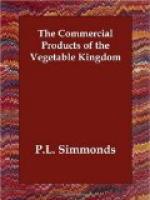The nuts or fruit of Brosimum Alicastrum, an evergreen shrub, native of Jamaica, are nutritious and agreeable articles of food. When boiled with salt fish, pork or beef, they have frequently been the support of the negroes and poorer sorts of white people in times of scarcity, and proved a wholesome and not unpleasant food; when roasted it eats something like our common chesnut, and is called bread-nut.
Kafir Bread.—According to Thunberg, the Hottentots being very little acquainted with agriculture, or with the use of the cerealia, and subsisting principally upon wild bulbs and fruits, obtain food also from Encephalartos caffer, a species of Zamia, with a cylindrical trunk, the thickness of a man’s body, and about seven feet high. Having cut down a tree, they took out the pith, that nearly fills its trunk, and which abounds in mucilage and an amylaceous fluid; after keeping this for some time buried under ground in the skin of an animal, they reduced it by pounding and kneading into a kind of paste; and then baked it in hot ashes, in the form of round cakes, nearly an inch thick. The Dutch colonists, in consequence of this practice of the natives, called the plant brood-boon, which signifies literally bread tree.
THE PLANTAIN AND BANANA.
The several varieties of the edible plantain which are known and cultivated throughout the West Indies, Africa, and in the East are all reducible to two classes, viz., the Plantain and the Banana (Musa Paradisiacaand sapientum). The difference between these two plants is even so slight as to be scarcely specific; it is therefore most probable that there was originally but one stock, from which they have, by cultivation and change of locality, been derived.
The tiger plantain (M. maculata) and the black ditto (M. sylvestris) are cultivated in Jamaica. The whole of the species and varieties of the tribe are what are called polygamous monoecious plants, each individual tree bearing the male and female organs of reproduction.
The plantain and its varieties invariably bear male, female and hermaphrodite flowers within the same spathe, all of them being imperfect and consequently unproductive of seed. An individual may, even from excess of culture, moisture, &c., be entirely incapable of flowering. During the prevalence of a disease or blight among the plantain walks of Demerara in the years 1844 and 1845, it was seriously proposed to introduce male plantains, or obtain fresh stock by seed.
It is, therefore, necessary to determine with exactness, if possible, whether the Plantain or Banana, (whichever be the parent stock) exists anywhere at present, or has been known to have existed as a perfect plant, that is bearing fertile seeds; or, whether it has always existed in the imperfect state, that is, incapable of being procreated by seed, the only state in which it at present exists in our colonies.




